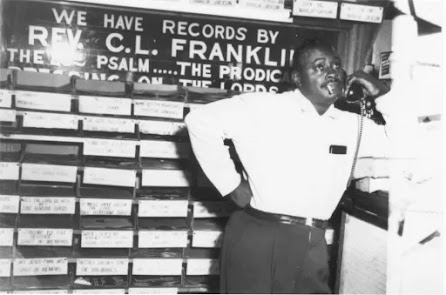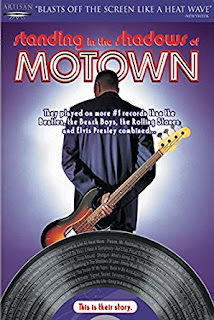 |
Eddie Wingate
|
One of the economic Titans in Detroit's African American community of the 1950s through the late 1970s was Eddie Wingate. Wingate was born in Moultrie, Georgia, on February 13, 1919, the oldest of six boys. Young Eddie quit school in his adolescence to work on a nearby farm to help support his family on two dollars a day. During the Great Depression, his $10-$12 weekly earnings went a long way, but he had ambition to do better.
Eddie kept hearing the old folks talk about the economic promised land of Detroit where Blacks were making good money working in the auto plants and steel mills. In the late 1930s, Wingate scraped together all the funds he could and drove to Detroit in his rundown Model T to seek his fortune.
At the age of nineteen, Wingate got a job with the Ford Motor Company. It is in the Ford plant that he became acquainted with the illegal numbers racket, called the Policy Racket by government prosecutors. He soon became involved with the business end of the operation.
After almost a decade of working on the assembly line and saving his money, Wingate quit his factory job and became the silent, majority owner of a restaurant named The 20 Grand Supper Club. He was also the sole owner of The 20 Grand Hotel next door where he ran his numbers empire and hosted Detroit's African American cafe society.
By 1961, Eddie Wingate was wealthy enough to pursue his passion for music. Along with his inamorata Joanne Jackson Bratton, they founded Golden World Records (GWR) that made waves in Detroit's pop music scene. Together, they established GWR, Ric-Tic Records, Wingate Records, and J&W Records, Inc. They built their own state of the art studio using the best musical equipment money could buy.
Wingate and Bratton developed their talent roster and used The Driftwood Lounge in the 20 Grand Supper Club, owned on paper by Bill Kabbus and Marty Eisner, as a performance venue for Edwin Starr, The Parliaments, the Manhattans, Laura Lee, and The Funkadelics. The popular venue was a good place to showcase their talent and build an audience to help sell records.
Wingate's personal friend Berry Gordy also used the Driftwood Lounge to break in his growing list of future Motown headliners like The Supremes, Little Stevie Wonder, The Temptations, and The Miracles to gain experience before sending them out on the "chitlin circuit" to hone their performance skills.
In 1968, Wingate and Bratton sold their record labels, their studio and production facilities, and their artists' contracts to Berry Gordy for one million dollars. Herion and cocaine were flooding the Black community and Wingate's adopted son became a junkie. Disgusted, Wingate turned his back on the hustlers in the music industry. The record business became more trouble than it was worth to him.
The 20 Grand Hotel at 2100 W. Warren Road next to the Supper Club was where Wingate ran his numbers empire from rooms called "The Hole." A Michigan State Police informant testified to a federal grand jury that Wingate's numbers operation included a professional sports book which took bets on football and baseball games ranging from $1,000 to $2,500 over the phone from all over the country . The undercover surveillance occured from June to November of 1976 and relied heavily on wiretapping transcripts.
Early in 1977, the FBI arrested the top operators of the massive inner city bookmaking and numbers running operation. Along with Eddie Wingate, other operators Clarence Williams, John White, Walter Simmons, and Burrell "Junior" Pace were indicted. The men pleaded nolo contendere and paid heavy fines but were never convicted.
The federal government was more interested in the organization's kingpins. In March 1977, a federal grand jury brought indictments against mafioso brothers Anthony and Vito Giacalone for tax evasion. Wingate sold his business interests and left Detroit for Florida. The weather was better there, as were his chances for survival. He left his family operation in the capable hands of his younger brothers.
As a side note, playing the numbers today survives in all fifty states as government run and controlled lotteries used as revenue producing vehicles. Government knew a good thing when it saw it. The odds of winning contemporary govenment lotto games are many thousands or millions of times higher than the classic street game which used only three numbers chosen from 000 to 999, rather than five or six numbers including double digits. It is ironic how laws and attitudes change. What people once went to jail for is now advertised on television and in every convienence and liquor store in the nation.
 |
Modern Michigan Lotto Slip
|
What is lesser known about Wingate outside of Detroit's Black community is that he and other numbers associates helped many Detroiters buy their first homes despite real estate covenants enshrining racial segregation. Entire White neighborhoods were redlined and off-limits to Blacks who could otherwise afford a conventional mortgage. They were routinely denied mainstream bank loans in desirable Detroit neighborhoods.
Wingate recognized opportunity when he saw it, so he went into the residential real estate business, financed by his gambling profits which were considerable. Authorities would say that he and his associates were loansharking and laundering money, but their clients had steady jobs and most could pay off their monthly mortgage payments on time.
Because of men like Eddie Wingate, Blacks in Detroit had a higher percentage of home ownership in the 1950s and 1960s than any other urban center in the country. To many Detroit residents, Eddie Wingate became a local folk hero despite his underworld activities and connections.
Wingate was sole owner of several commercial buildings which were essentially number and money drops where people from the community were employed as money counters and accountants to keep his game running smoothly. It has been estimated that every dollar spent on the numbers circulated as many as five times in the neighborhoods where the game was played.
Wingate also mentored, influenced, and helped finance many
Black entrepreneurs to get started in businesses providing employment
and services to city residents. In many respects, Wingate was a rainmaker who brought prosperity to many people enduring hard times.
Eddie Wingate died in Las Vegas on May 5, 2006, at the age of 86. His body was taken back to Detroit for a funeral service at New Bethel Baptist Church on Saturday, May 13th. Wingate's body was interred at Roseland Park Cemetery on Woodward Avenue in Berkley, Michigan.
Mr. Don Davis, chairman of the First Independence Bank in Detroit, wrote in Wingate's online funeral guestbook, "He was the go-to guy (in Detroit) to get anything done of any magnitude if you were Black. The guy held the community together."
Detroit's Numbers Racket


















